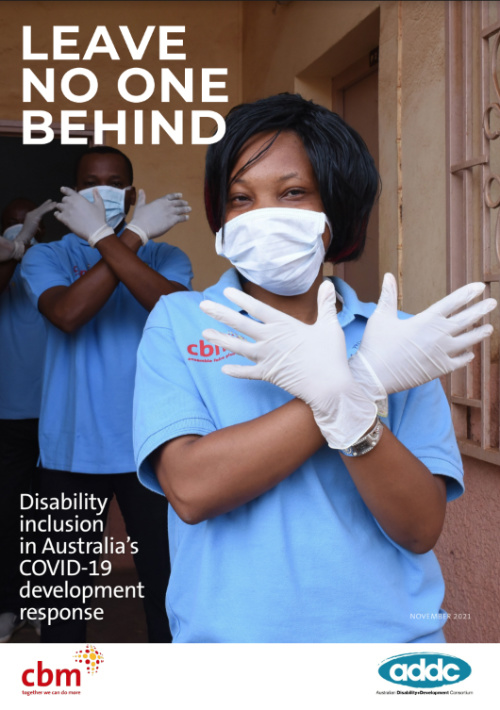Updated 4.30pm (AEDT)
Sydney, Australia
The COVID-19 pandemic has created a “perfect storm” of inequality and injustice for people with disabilities around the world, with a new report saying half the people who contract the virus and die are people with a disability.
Those living with disabilities have experienced poorer health outcomes during the pandemic, increased violence and abuse, greater mental health issues, as well as less access to education and reduced services and support, the report by Christian international development organisation CBM Australia alongside the Australian Disability and Development Consortium, has revealed.

The Leave No One Behind report was released on 3rd December, 2021, to coincide with the International Day of People with Disability. It used data from the United Kingdom that showed people with disabilities were more likely to die from COVID-19, which CBM says would mean similar outcomes in low and middle-income nations.
CBM is an international development organisation that runs programs globally as part of Australia’s Department of Foreign Affairs and Trade funded international aid.
CBM CEO Jane Edge says if the experience of the UK is true, “the reality is, in countries where services are even less available and information is likely to be even more impossible to receive, we’re going to see a similar scenario playing out”.
Australia had an opportunity to continue to demonstrate “real leadership” in disability inclusion, principally “the success of policy to development for all”, she said.
“We would expect there to be much more significant impact for people with disabilities in the countries where we’re working,” Edge told Sight. “In those contexts of poverty in an environment that is less supportive even than Australia…that is why we talk about it [COVID-19] being a catastrophic impact.”
The report warns that the pandemic has created “a perfect storm where the barriers already facing people with disabilities are increasing on multiple fronts” and that without action, the pandemic could set back social and economic gains Australian aid has achieved in the region in the past decade.
“Yet despite their high vulnerability, people with disabilities are not being adequately targeted or prioritised in COVID-19 responses,” the report said.
“Research…shows that if COVID-19 responses do not actively target people with disabilities, this group will be left further behind – further excluded from socio-economic development as communities start to recover.”
Edge said budgets, including the foreign aid program, often are affected by different things at different times, but if Australia maintained a really strong and sustained policy commitment, then data, measurement, investment and building of capability would follow.
“The other thing is “ask” the organisations of people with disabilities what are the things that are important to them [and] I think in the pressure of COVID-19, that has not been something that’s been prioritised – that’s a global challenge. Globally, we have seen a catastrophic failure to protect the lives, rights and health of people with disability.”

Jane Edge, CEO of CBM Australia. PICTURE: Supplied.
Worldwide, 15 per cent, or one in seven, people have a disability; around one billion people and 22 per cent of the world’s poorest people have a disability.
The report revealed 85 per cent of people with disabilities surveyed in Vietnam, Indonesia and the Philippines affected by COVID-19 lockdowns were yet to receive any financial assistance, while also highlighting the heavy mental health toll globally.
It showed women and girls with disabilities were “at least two to three times more likely to experience physical and sexual abuse than women without disabilities in the Indo-Pacific-region”.
People with disabilities were also less likely to attend school, were more likely to be unemployed, but earned less when employed.
Edge said in any emergency, people with disabilities are often left behind – “that’s the challenge of it” – but preconditions for inclusion, particularly in the Asia-Pacific region, included such things as sign- language for deaf children who often missed out on education.
“We don’t have enough data across the board, so data, evidence, policy, and then get very practical about supporting organisations of people with disabilities and governments and partners in the Pacific to deliver practical, inclusive programming on the ground.”
The report involved widespread consultations with organisations of persons with disabilities across Asia, the Pacific and Africa during 2020-2021.
Edge said Australia was one of the first to sign the UN Convention on the Rights of Persons with Disabilities and the first to introduce a strategy for disability-inclusive international development.
“However, at a time when the need is greatest, investment in core disability funding has been reduced. We need to see an urgent increase in investment in disability-inclusive recovery in our region.
“With 80 per cent of people with disabilities around the world living in low and middle-income countries, the time for change is now,” Edge said.
We rely on our readers to fund Sight's work - become a financial supporter today!
For more information, head to our Subscriber's page.
To this end she said an increase in Australia’s foreign aid budget was needed to ensure equality for all.
The Australian Council for International Development is the peak body for the international NGO sector in Australia.
Its 2021 advocacy platform set out their “asks” of the Federal Government, including making the 10 per cent ($A400 million) increase in total Official Development Assistance in 2020- 2021 permanent and recurrent.
In addition to this, it asked for a further $A3.56 billion to be allocated in new development funding over four years targeting strengthening health systems, social protection, disability inclusion and humanitarian response.
“Good development is actually good for Australia and we should invest and hold that investment as it’s been made available at this time, to ensure we continue to actually have a recovery that is long lasting in the region,” Edge said. “It’s about making those targeted measures an agreed ongoing level of support in the region.”
This included specifically targeting “disability in its COVID-19 development response”.
The report made six recommendations, including adopting the “nothing about us without us” principle that would include people with disabilities in all decision-making processes.
It suggested partnerships between governments, the private sector and development organisations with disability organisations to ensure localised pandemic responses, and in identifying barriers preventing accessibility for resources, services and communication.
It also recommended that DFAT aid policy ‘Partnerships for Recovery’ be coupled with a “detailed, multi-year strategy on disability inclusion which clearly articulates how people with disabilities will be prioritised in Australia’s aid program, including the COVID-19 response”.
As well, people with disabilities should be prioritised for early COVID-19 vaccinations, providing information in accessible formats such as braille, and sign-language and ensure vaccination facilities and services have fully accessible toilets, footpaths, buildings and equipment, and accessible transport.





